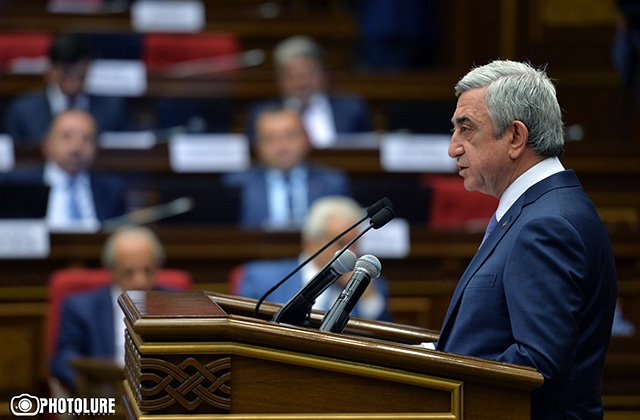What did Serzh Sargsyan hint?

For Hrant Melik-Shahnazaryan, political scientist, in recent developments the most important was neither the fact that Azerbaijanis shelled the Armenian equipment, nor the countermeasures, which the Armenian side has taken, which to a certain extent, calmed down the situation on the border, they are different political processes, which according to him, we edify and during which rather interesting accentuations were recorded.
He singled out a few of them. “In his speech at the National Assembly president Serzh Sarsgyan said that by saying concession we understand realization of the right of Artsakhi people to self-determination, and basically, new assessment is provided to the concept mutual concession.
If prior to the April developments by saying mutual concession the Armenian side supposed also concession of territories to Azerbaijan, currently it only observes Artsakh’s right to self-determination, official Yerevan doesn’t touch upon other concessions now,” he said, stressing also that Serzh Sargsyan criticized Madrid Principles, which speaks of the fact that in future it’ll be impossible to rely on that document.
“The president said they cause many issues, and it’s good that they weren’t brought into life. Such criticism was heard for the first time by official Yerevan, which showed that positions of the Armenian side in negotiations have changed,” he said.
As for the statement by Serzh Sargsyan that although Kazan document wasn’t sent to the archive, until now no one has accurately introduced the document touched upon for years, he said,
“There is a mention of quite a different document, which isn’t yet known, no one spoke of it. This also allows to suppose that in negotiations the situation isn’t what it’s often introduced in media outlets—there are other documents as well. There was mention of the document’s being pro-Armenian in president’s speech: Aliyev complains and confesses—he is urged to recognize Artsakh’s independence.”
According to the political scientist this is encouraging, and he considers there were clear hints on the level of the country’s president that the logic of negotiations has changed.
By Razmik Martirosyan

























